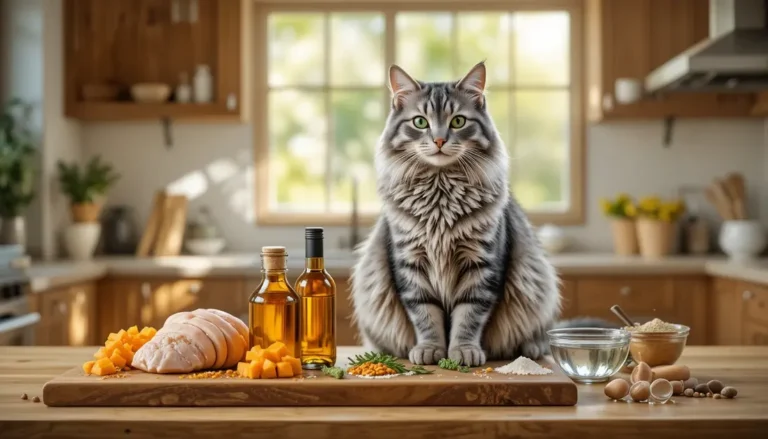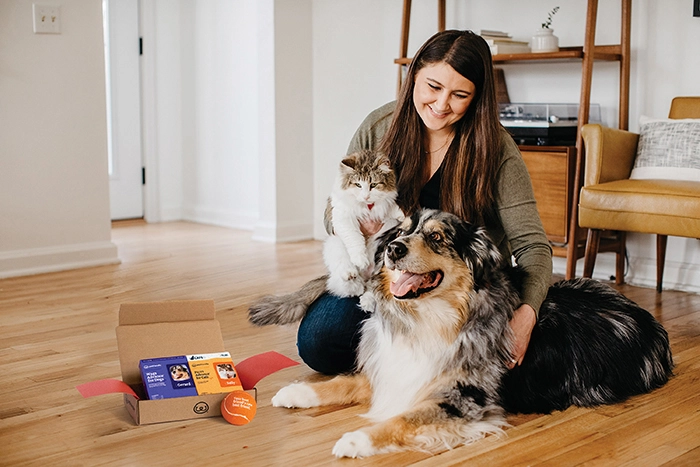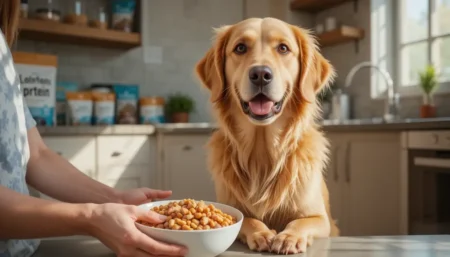Cats need six essential nutrients daily: protein, fats, carbohydrates, vitamins, minerals, and water. A balanced diet with these nutrients supports their energy, organ function, and overall health.
Understanding what your cat requires helps you choose better food and spot potential health issues early. This guide breaks down each nutrient, explains how much your cat needs, and shows you how to pick the right diet for every life stage.
Why Proper Nutrition Matters for Cats
Your cat’s body is a precision machine that runs on specific fuel. Unlike dogs or humans, cats are obligate carnivores, meaning they must eat meat to survive.
Their digestive systems evolved to process animal tissue efficiently, and missing even one key nutrient can trigger serious health problems.
Poor nutrition doesn’t always show up immediately. A taurine deficiency, for example, can take months to cause heart disease or vision loss. Similarly, low water intake gradually stresses the kidneys, potentially leading to chronic kidney disease—the leading cause of death in senior cats.
The right balance of essential nutrients for cats prevents these slow-motion health crises before they start.
Veterinary research shows that 60% of cats in the U.S. are overweight or obese, often due to calorie-dense but nutrient-poor diets.
Quality nutrition isn’t just about survival; it’s about giving your cat the energy for play, the building blocks for a shiny coat, and the immune support to stay healthy for 15+ years.

The 6 Essential Nutrients for Cats Explained
Every nutrient plays a unique role. Let’s examine what each does and where to find it.
1. Protein and Amino Acids: The Foundation of Feline Health
Protein isn’t just important for cats—it’s everything. This nutrient provides the 22 amino acids your cat needs to build muscle, produce enzymes, and maintain healthy skin.
Cats require significantly more protein than dogs: adult cats need at least 26% of their diet to be protein, while kittens need 30% or more.
The key difference? Cats cannot synthesize 11 essential amino acids on their own. Taurine tops this list. Without adequate taurine, cats develop dilated cardiomyopathy (a fatal heart condition) and retinal degeneration, leading to blindness.
Unlike other mammals, cats can’t make taurine from other amino acids, so it must come directly from their food.
Best sources: Named meat meals (chicken meal, salmon meal) and whole meats. These contain complete amino acid profiles. Plant proteins like soy or peas are less bioavailable for cats and often lack sufficient taurine.
Practical tip: Check the ingredient list. The first ingredient should be a specific meat or meat meal, not “meat by-products” or grains. High-quality freeze-dried toppers can boost protein intake for picky eaters.
2. Fats and Fatty Acids: Energy and Brain Fuel
Fats deliver concentrated energy—more than twice the calories per gram compared to protein or carbs. But their real value lies in essential fatty acids. Cats need specific omega-6 and omega-3 fatty acids that they can’t produce themselves.
Arachidonic acid, an omega-6 fatty acid, supports skin health, blood clotting, and reproductive function. Without it, cats develop dry, flaky skin and poor wound healing.
Omega-3s like DHA and EPA reduce inflammation, support brain development in kittens, and help older cats with joint stiffness.
The ratio matters. Most experts recommend an omega-6 to omega-3 ratio between 5:1 and 10:1 for optimal health.
Best sources: Chicken fat, fish oil, and egg yolks. Look for foods with “preserved with mixed tocopherols” (natural vitamin E) rather than artificial preservatives.
Practical advice: For cats with dry skin or dull coats, adding a fish oil supplement can show improvement in 4–6 weeks. Always measure carefully—fats are calorie-dense, and over-supplementation leads to weight gain.
3. Carbohydrates: Not Essential, But Useful
Here’s a surprise: cats have no dietary requirement for carbohydrates. Their bodies can produce glucose from protein through gluconeogenesis. However, this doesn’t mean carbs are bad.
Small amounts of digestible carbohydrates provide quick energy and help kibble hold its shape. Fiber, a type of carbohydrate, supports healthy digestion and prevents hairballs. The trick is keeping carbs minimal and high-quality.
What to look for: Avoid foods listing corn, wheat, or soy as primary ingredients. These are cheap fillers with low nutritional value for cats. Instead, choose foods with sweet potato, pumpkin, or peas in small amounts.
Warning sign: If your cat’s food contains more than 20% carbohydrates, you’re likely paying for filler, not nutrition. Grain-free isn’t automatically better—some grain-free foods replace grains with other high-carb ingredients like tapioca.
4. Vitamins: Micronutrients with Macro Impact
Vitamins act as catalysts for countless bodily functions. Cats need both fat-soluble vitamins (A, D, E, K) and water-soluble vitamins (B-complex, niacin, thiamine) in precise amounts.
Vitamin A: Cats can’t convert beta-carotene from plants into active vitamin A. They must get preformed vitamin A from animal liver. Deficiency causes night blindness and weak immune function.
Vitamin D: Regulates calcium and phosphorus for bone health. Unlike humans, cats can’t synthesize vitamin D from sunlight. They need it in their diet.
B Vitamins: Crucial for energy metabolism. Cats eating cooked homemade diets often lack B vitamins, which are destroyed by heat.
Danger of over-supplementation: Fat-soluble vitamins accumulate in the body. Excess vitamin A causes bone deformities, while too much vitamin D leads to kidney failure. Never supplement without veterinary guidance.
Practical tip: Choose foods that meet AAFCO (Association of American Feed Control Officials) standards. These have been tested to contain the correct vitamin balances. If you home-cook, use a vet-formulated recipe and add a feline vitamin premix.
5. Minerals: Building Blocks and Cellular Workers
Minerals comprise only about 1% of your cat’s diet but impact nearly every physiological process. They fall into two categories: macrominerals (needed in larger amounts) and trace minerals (needed in tiny amounts).
Critical macrominerals:
- Calcium and phosphorus: Must stay in a precise 1.1:1 to 1.5:1 ratio. Imbalance causes bone problems and kidney issues. Meat alone is high in phosphorus but low in calcium, which is why raw diets need bone meal or supplements.
- Magnesium: Important for enzyme function, but excess magnesium contributes to urinary crystals and painful blockages, especially in male cats.
Essential trace minerals:
- Iron: Carries oxygen in blood. Deficiency causes anemia.
- Zinc: Supports skin health and wound healing.
- Selenium: Works with vitamin E as an antioxidant.
Quality indicator: Good cat foods list mineral “proteinates” or “chelates” (like zinc proteinate). These are more easily absorbed than inorganic forms like zinc oxide.
Practical advice: If your cat has urinary issues, choose a food with controlled magnesium levels (0.1% or less) and encourage water intake with a fountain. Many prescription urinary diets manipulate mineral content to prevent crystal formation.
6. Water: The Most Overlooked Nutrient
Water isn’t just essential—it’s life. Cats have a low thirst drive inherited from desert-dwelling ancestors. In the wild, they get most of their water from prey (which is 70% water). Dry kibble contains only 10% moisture, creating a chronic dehydration risk.
Insufficient water intake concentrates urine, stressing the kidneys and bladder. This contributes to kidney disease and urinary tract problems, which affect 1 in 3 cats over age 10.
How much water does your cat need? Cats need approximately 3.5–4.5 ounces of water per 5 pounds of body weight daily. A 10-pound cat needs about 7–9 ounces (a cup) of water from food and drinking combined.
Best hydration strategies:
- Feed wet food, which is 75–80% water
- Use a cat water fountain (cats prefer running water)
- Place multiple water bowls away from food and litter boxes
- Add water or low-sodium broth to dry food
Practical tip: If your cat eats only dry food, consider adding one wet meal daily. Even a 3-ounce can of wet food provides 2.5 ounces of water—about one-third of their daily needs.

Adjusting Essential Nutrients for Cats
Nutritional needs shift dramatically throughout your cat’s life. A one-size-fits-all approach doesn’t work.
Kittens (0–12 months)
Kittens grow rapidly, requiring 2–3 times more calories per pound than adult cats. They need higher protein (30–35%) and fat (20–25%) for development. DHA, an omega-3 fatty acid, is critical for brain and vision development during the first 6 months.
Mistake to avoid: Feeding a kitten food for too long can cause rapid weight gain. Switch to adult food around 12 months (large breeds like Maine Coons may need longer).
Adult Cats (1–7 years)
Focus shifts to maintenance. Protein needs remain high (26–30%), but caloric needs drop. Activity level determines portions—an indoor cat needs 20–30% fewer calories than an outdoor hunter.
Watch for: Weight gain. Use a body condition score chart monthly. You should feel your cat’s ribs with light pressure but not see them.
Senior Cats (7+ years)
Metabolism slows, but protein needs stay high to prevent muscle loss. Kidney function often declines, making water intake even more crucial. Many seniors develop arthritis, so omega-3s for joint support become important.
Key adjustment: Switch to senior-formulated food with easily digestible protein, moderate phosphorus (0.5–0.8%), and added glucosamine. Wet food is non-negotiable for kidney health.
Homemade vs. Commercial Diets
The homemade diet trend is growing, but is it safe?
Commercial Cat Food Pros
- Formulated by veterinary nutritionists to meet exact nutrient requirements
- Undergoes feeding trials and analysis
- Convenient and consistent
- Meets AAFCO standards for completeness
Commercial Cat Food Cons
- Quality varies wildly between brands
- May contain unnecessary fillers
- Less control over ingredient sourcing
Homemade Diet Pros
- Full control over ingredients
- No preservatives or additives
- Can use whole, fresh foods
- Appealing for cats with allergies
Homemade Diet Cons
- Extremely difficult to balance nutrients correctly. A 2019 study in the Journal of the American Veterinary Medical Association found that 95% of online homemade cat food recipes were nutritionally inadequate, particularly in taurine, calcium, and B vitamins.
- Time-consuming and expensive
- Risk of bacterial contamination from raw meat
Verdict: Unless you work with a board-certified veterinary nutritionist who formulates a custom recipe and recommends specific supplements, stick with high-quality commercial food. You can enhance it safely with treats like cooked chicken or approved toppers, but don’t try to build a complete diet from scratch.
If you insist on homemade, use a service like BalanceIT, which provides veterinary-formulated recipes and custom supplement mixes. Never feed cooked bones (they splinter) or raw diets without understanding the serious contamination risks.
Signs Your Cat Isn’t Getting Essential Nutrients
Nutritional deficiencies develop gradually. Watch for these red flags:
Protein deficiency: Dull coat, muscle wasting, poor wound healing, frequent infections
Fatty acid deficiency: Dry, flaky skin, excessive shedding, slow hair growth
Vitamin A deficiency: Night blindness, rough coat, weakness
B vitamin deficiency: Poor appetite, weight loss, seizures (severe thiamine deficiency)
Mineral imbalance: Urinary issues (magnesium), bone fractures (calcium/phosphorus imbalance), pale gums (iron)
Dehydration: Dark urine, infrequent urination (less than 2-3 times daily), lethargy
Action step: If you notice any of these signs, schedule a veterinary exam. Bring your cat’s food label or recipe. Blood tests can identify specific deficiencies before they cause permanent damage.

How to Choose the Right Cat Food
Walking down the pet food aisle is overwhelming. Use this checklist to evaluate any cat food:
✅ AAFCO Statement: Look for “complete and balanced for [life stage]” based on feeding trials, not just nutrient profiles. This ensures real cats actually thrived on it.
✅ Named Protein First: “Chicken,” “turkey meal,” or “salmon” should be the first ingredient. Avoid vague terms like “meat meal” or “poultry by-products.”
✅ Moderate Carbs: Check the guaranteed analysis. Protein + fat + moisture + ash should equal 90% or more. The remainder is largely carbohydrates.
✅ Appropriate Calorie Density: Indoor cat foods should be 350–400 kcal/cup. High-protein foods may be 450+ kcal/cup—measure carefully.
✅ Company Transparency: Choose brands that employ veterinary nutritionists, manufacture their own food (don’t co-pack), and provide detailed nutrient analyses upon request.
✅ Recall History: Research the brand online. Frequent recalls suggest quality control issues.
Price vs. Value: A $40 bag of high-quality food often costs less per feeding than a $20 bag of low-quality food because you feed less volume. Better nutrient absorption means smaller, less frequent stools and better health.
Wet vs. Dry: Feed at least 50% wet food if possible. If budget limits you, even one wet meal daily dramatically improves hydration. For dry food, choose small kibble sizes to encourage chewing.
FAQs About Essential Nutrients for Cats
Can cats be vegan or vegetarian?
No. Cats require nutrients found only in animal tissue: taurine, preformed vitamin A, arachidonic acid, and others. Feeding a vegan diet causes severe, fatal deficiencies. This is non-negotiable feline biology.
Do indoor cats need different nutrients than outdoor cats?
The essential nutrients for cats remain the same, but portions differ. Indoor cats need 20–30% fewer calories due to lower activity. Some indoor formulas add extra fiber for hairball control, but the core nutrient profile doesn’t change.
Is raw food better for providing essential nutrients?
Raw meat preserves heat-sensitive nutrients like thiamine, but contamination risks (Salmonella, E. coli) are real. A 2018 study found 25% of commercial raw diets contained harmful bacteria. Raw diets also often have mineral imbalances. If you choose raw, use a commercial formula that underwent high-pressure processing (HPP) to kill pathogens and meets AAFCO standards.
How do I know if my cat’s food has enough taurine?
Check the ingredient list for meat sources and the guaranteed analysis. Reputable brands add supplemental taurine and list it explicitly. The AAFCO minimum is 0.1% for dry food and 0.2% for wet food. Foods that passed feeding trials provide better assurance than those meeting only nutrient profiles.
Should I give my cat supplements?
If you’re feeding a complete, balanced commercial diet, supplements are unnecessary and potentially dangerous. Excess minerals can cause urinary stones, and fat-soluble vitamins accumulate. Only supplement if your veterinarian identifies a specific deficiency through blood work.
My cat only likes dry food. How can I improve their nutrition?
Add water to the kibble—start with 1 tablespoon per 1/4 cup of food. Use a wide, shallow bowl (cats dislike whisker contact). Try different kibble shapes and flavors. Gradually mix in small amounts of wet food, increasing the ratio over 2–3 weeks. A pet fountain can encourage drinking.
Conclusion
Balancing essential nutrients for cats isn’t about perfection—it’s about consistency and quality. Here’s your three-step plan:
- Audit your cat’s current food. Does it have a named meat first? AAFCO statement? Appropriate for their life stage? If not, research three alternatives that meet our checklist criteria.
- Implement the 50/50 rule. Aim for at least half of your cat’s diet to be wet food. If that’s unrealistic, start with one wet meal daily and add water to dry food.
- Monitor your cat’s body condition. Feel their ribs monthly. Watch their litter box habits. Note coat quality. These daily observations catch nutritional issues before they become crises.
Remember, the best diet is one your cat will eat consistently. A high-quality food that your cat refuses helps no one. Find the intersection between nutritional excellence and feline approval.
Your cat depends entirely on you to provide the right fuel. With the knowledge from this guide, you can confidently read labels, spot quality, and make informed decisions that add healthy years to your cat’s life.






